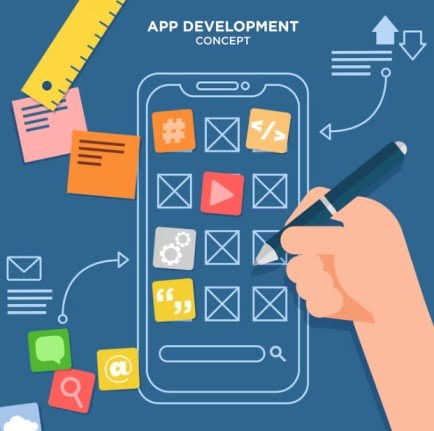Important Aspects to Consider in Business App Development
In today's digital age, mobile apps have become integral to business success, offering a convenient way to engage with customers, streamline operations, and enhance brand presence. However, developing a mobile app for your business is not a straightforward task. It requires careful planning, strategic decisions, and a deep understanding of both your business needs and user expectations. In this blog, we will explore the mobile app development considerations that every business should keep in mind, along with practical app development tips and essential app development features to ensure the success of your project.
What is Mobile App Development for Businesses?

Mobile apps have transformed how businesses operate, providing enhanced customer engagement, improved accessibility, and personalized experiences. With the rise of smartphones and mobile internet usage, businesses need to meet customers where they are—on their mobile devices. A well-developed mobile app can serve as a powerful tool to increase brand loyalty, drive revenue, and provide valuable data insights.
However, simply having an app is not enough. It must be designed and built with precision, keeping various factors in mind. Whether you're a startup, SME, or large corporation, developing an app can be a complex task that involves multiple phases, from concept creation to post-launch maintenance. In this blog, we'll break down the key app development tips and considerations to guide you through the process.
Define Your Objectives and Target Audience
Before starting the development process, it’s crucial to define your business objectives and the purpose of the app. Ask yourself:
What problem will the app solve for your customers?
How will the app fit into your business strategy?
What is the primary goal of the app (e.g., increased sales, enhanced customer service, brand engagement)?
Understanding your objectives will help in defining the app's features and overall functionality. Additionally, identifying your target audience is essential. Your app’s design, features, and user experience should cater to the needs of your users. Consider factors such as age, geographic location, device preferences, and behavior patterns.
App development tip: Always keep the end-user in mind. A successful app is one that is user-centric, addressing pain points and delivering value.
Choose the Right Platform
Another critical mobile app development consideration is the platform on which your app will be available. The most common platforms are iOS and Android, and each has its pros and cons. iOS users tend to spend more on apps, while Android dominates in terms of global market share.
You can choose between the following approaches:
Native apps:
Built specifically for iOS or Android, offering better performance and user experience.
Cross-platform apps:
Developed to run on multiple platforms (e.g., Flutter, React Native), offering a faster development process and reduced costs.
App development tip:
If budget allows, developing native apps for both platforms can provide a more seamless experience. However, cross-platform development is an excellent choice for startups or businesses with limited resources.
Focus on User Experience (UX) and User Interface (UI) Design

A well-designed app is not just aesthetically pleasing but also easy to use. The user experience (UX) and user interface (UI) are critical components that determine how users interact with your app. Your app's navigation should be intuitive, and the design should align with your brand identity.
Important app development features related to UX/UI include:
Simple and clean navigation
Fast loading times
Clear call-to-action buttons
Consistent design elements (color scheme, typography)
Responsive design for different screen sizes and devices
Mobile app development consideration: Poor UX/UI design can lead to user frustration and ultimately drive customers away. Therefore, it's essential to invest in professional design services that focus on enhancing usability.
Integrate Essential Features
When it comes to app development features, it's easy to get carried away and overload your app with unnecessary functionality. However, it's important to focus on core features that align with your business goals and add value to your users. Some essential app development features to consider include:
Push notifications:
These can be used to engage users, remind them of promotions, or share updates.
In-app payments: Offering secure and convenient payment options can help boost sales.
Social media integration:
Allowing users to share content or log in via social platforms can enhance engagement.
Location-based services: Features like geofencing or GPS tracking can provide personalized offers or services based on the user's location.
Analytics and reporting:
Gathering data on user behavior, session duration, and popular features can help you optimize the app over time.
App development tip:
Start with a Minimum Viable Product (MVP) that includes the core features, and gradually add more functionality based on user feedback.
Prioritize Security and Data Privacy
With growing concerns over data breaches and cyber-attacks, security should be one of the top mobile app development considerations. Ensuring that user data is protected is crucial to gaining and maintaining customer trust.
Key security app development tips include:
Implementing encryption for data storage and transmission
Using secure APIs
Enforcing strong authentication methods (e.g., two-factor authentication)
Regularly updating the app to patch vulnerabilities
If your app deals with sensitive data, such as financial transactions or personal information, additional security measures like biometric authentication (fingerprint or facial recognition) should be considered.
Testing and Quality Assurance
Testing is an often-overlooked but vital part of the app development process. Ensuring that your app is bug-free, responsive, and functions as expected across various devices and operating systems is crucial before launch. Conduct different types of tests, such as:
Functional testing:
Ensures that all features work as intended.
Performance testing:
Measures how the app performs under different conditions (e.g., low battery, poor network).
Usability testing:
Checks how user-friendly the app is.
Security testing:
Verifies that the app is secure and free from vulnerabilities.
Mobile app development consideration: Comprehensive testing will help you avoid costly issues post-launch and ensure that users have a positive experience.
Plan for Ongoing Maintenance and Updates
The app development process doesn’t end with launch. Regular updates, bug fixes, and feature improvements are necessary to keep the app functional and relevant. It's also important to monitor user feedback and make adjustments as needed.
App development tip:
Set up a plan for post-launch maintenance that includes regular performance checks, updates for new OS versions, and feature enhancements based on user feedback.
Budget and Timeline Management
Developing an app is a significant investment, both in terms of time and money. It's essential to plan your budget carefully and allocate resources to each phase of the development process, from design to testing to post-launch support. Additionally, setting realistic timelines is crucial. Rushed development often leads to mistakes and overlooked details.
App development tip:
Break down the development process into phases, and allocate resources to each step. Be prepared for unexpected costs, especially in testing and post-launch maintenance.
Conclusion
Developing a mobile app for your business is an exciting opportunity to expand your brand's reach, improve customer engagement, and streamline operations. However, success depends on thorough planning, careful decision-making, and attention to detail. By keeping the key mobile app development considerations in mind, such as defining your objectives, choosing the right platform, focusing on UX/UI design, integrating essential app development features, prioritizing security, and planning for post-launch maintenance, you can ensure that your app becomes a valuable asset for your business.
Incorporating these app development tips into your strategy will help you create a user-friendly, secure, and effective mobile app that meets your business goals and delights your users.
